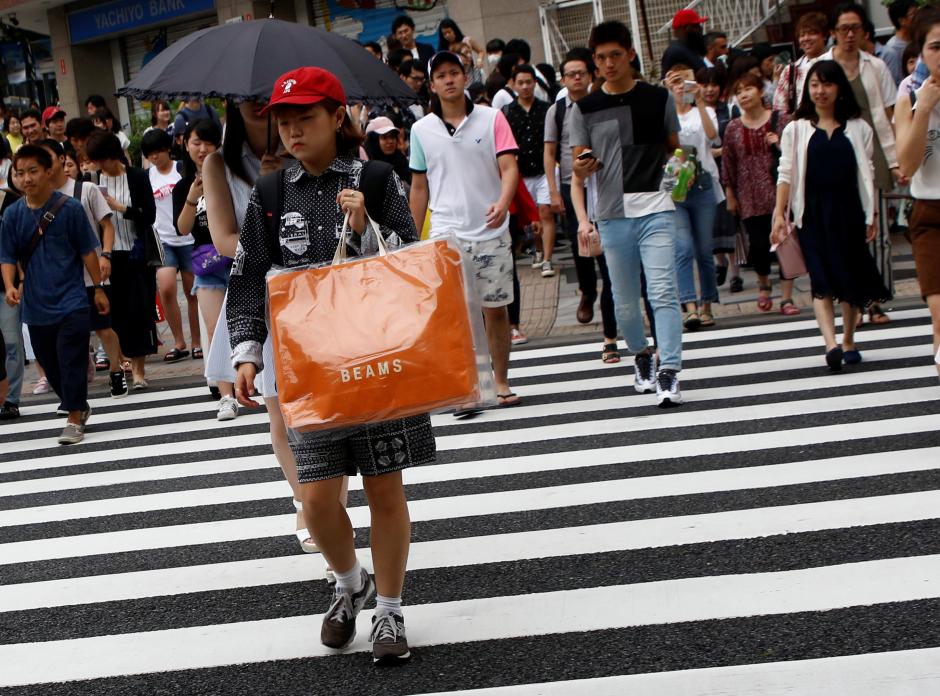
The tightest labour market since the 1970s seems to be playing a role. Temporary and part-time workers are getting paid more to help fill shifts and that is helping lift sales.
Consumption was the main driver behind Japan’s second-quarter economic growth, which expanded at an annualised 4%, gross domestic product data released on Monday showed, the strongest in more than two years and much higher than the growth achieved by the United States and the European Union.
Japan returns to trade deficit in January
Wage hikes for part-time workers in Japan have accelerated, rising to 2.3% year-on-year in May from 0.7% in August 2016. Salaries for full-time workers, though, have seen little change.
Susumu Ikeda, 70, says shoppers are buying more at his musical instrument shop in Tokyo’s Ginza shopping district and senses the economy is taking a turn for the better.
“Some may be cynical about our growth, but compared to our worst, we are getting much better,” he said. Furniture maker Nitori Holdings, convenience store leader Seven & i Holdings Co and coffee shop chain Doutor Nichires Holdings all reported rising domestic sales in their recent earnings reports.
Sales of new cars accelerated in April-June from the previous quarter and gross domestic product (GDP) data showed higher purchases of appliances, such as air conditioners.
Private consumption - which accounts for almost 60% of GDP - rose in the second quarter at the fastest pace in more than three years, offering the most definitive sign yet that consumers have shaken off the impact of a sales tax hike in 2014.
For some, like 31-year-old Tokyo office worker Natsuki Abe, the economy just feels healthier.
“I do think the economy is doing better than it was before, but it’s just a feeling,” she said. “My company is doing well and I think I do have the money to spend on things that I like and want. I mainly spend on clothes.”
Competing for workers
There have been previous such advances that have turned out to be temporary during Japan’s many years of economic weakness since the early 1990s, with consumer spending often a culprit as it loses momentum.
This time may be different, though, some economists argue. That is because the unemployment rate is now low enough - 2.8% - to lift wages.
Many economists say Japan reaches full employment, the lowest level of joblessness before upward wage pressures arise, when the jobless rate falls to 3%.
Japan’s ageing population, and the resulting big drop in the size of its workforce, is a major reason for this.
“Wage growth will accelerate going forward because companies have to raise wages to compete for new workers and to retain workers,” said Takuji Adia, chief economist at Societe Generale. “This happens when the unemployment rate falls below 3%.”
When Prime Minister Shinzo Abe took office in late 2012, the jobless rate was at 4.3%. Consumer spending boomed as a stock market rally fuelled optimism about the new government, but then lost momentum because wages were not rising that much.
Tourism sector: Japan to launch youth exchange programme
Some of Abe’s structural reforms, such as narrowing the wage gap between contractors and full-time employees doing the same work, raising the minimum wage and encouraging people to move to better-paying jobs, are also starting to pay off.
Deflationary mindset
One major concern is that Japan’s consumer spending revival has yet to translate into faster inflation. Core consumer prices rose a meagre 0.4% in the year to June and inflation expectations remain weak.
The United States and Europe are also struggling to generate inflation despite improving growth, but Japan’s case is peculiar because of the decades of deflation and stagnation following the collapse of the bubble economy in the early 1990s.
That has produced a deflationary mindset among many people that cannot easily be changed. And as the country’s population shrinks and ages, saving for the future has become a top priority for many.
“My husband’s parents and my parents are getting old and their pensions will not be enough for them to sustain themselves,” said Chisa Tsubuki, a 28-year-old childcare worker. “So in anticipation for the future where nursing and healthcare costs will rise for us, we need to save.”
Published in The Express Tribune, August 15th, 2017.
Like Business on Facebook, follow @TribuneBiz on Twitter to stay informed and join in the conversation.

















COMMENTS
Comments are moderated and generally will be posted if they are on-topic and not abusive.
For more information, please see our Comments FAQ